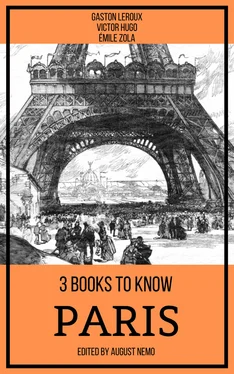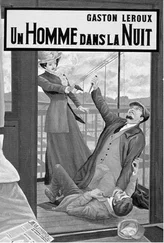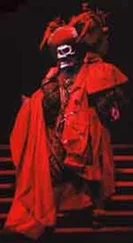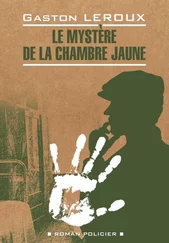“Messire,” said Gisquette, with the impetuosity of an open sluice, or of a woman who has made up her mind, “do you know that soldier who is to play the part of Madame the Virgin in the mystery?”
“You mean the part of Jupiter?” replied the stranger.
“Hé! yes,” said Liénarde, “isn’t she stupid? So you know Jupiter?”
“Michel Giborne?” replied the unknown; “yes, madam.”
“He has a fine beard!” said Liénarde.
“Will what they are about to say here be fine?” inquired Gisquette, timidly.
“Very fine, mademoiselle,” replied the unknown, without the slightest hesitation.
“What is it to be?” said Liénarde.
“‘The Good Judgment of Madame the Virgin,’—a morality, if you please, damsel.”
“Ah! that makes a difference,” responded Liénarde.
A brief silence ensued—broken by the stranger.
“It is a perfectly new morality, and one which has never yet been played.”
“Then it is not the same one,” said Gisquette, “that was given two years ago, on the day of the entrance of monsieur the legate, and where three handsome maids played the parts—”
“Of sirens,” said Liénarde.
“And all naked,” added the young man.
Liénarde lowered her eyes modestly. Gisquette glanced at her and did the same. He continued, with a smile,—
“It was a very pleasant thing to see. To-day it is a morality made expressly for Madame the Demoiselle of Flanders.”
“Will they sing shepherd songs?” inquired Gisquette.
“Fie!” said the stranger, “in a morality? you must not confound styles. If it were a farce, well and good.”
“That is a pity,” resumed Gisquette. “That day, at the Ponceau Fountain, there were wild men and women, who fought and assumed many aspects, as they sang little motets and bergerettes.”
“That which is suitable for a legate,” returned the stranger, with a good deal of dryness, “is not suitable for a princess.”
“And beside them,” resumed Liénarde, “played many brass instruments, making great melodies.”
“And for the refreshment of the passers-by,” continued Gisquette, “the fountain spouted through three mouths, wine, milk, and hippocrass, of which every one drank who wished.”
“And a little below the Ponceau, at the Trinity,” pursued Liénarde, “there was a passion performed, and without any speaking.”
“How well I remember that!” exclaimed Gisquette; “God on the cross, and the two thieves on the right and the left.” Here the young gossips, growing warm at the memory of the entrance of monsieur the legate, both began to talk at once.
“And, further on, at the Painters’ Gate, there were other personages, very richly clad.”
“And at the fountain of Saint-Innocent, that huntsman, who was chasing a hind with great clamor of dogs and hunting-horns.”
“And, at the Paris slaughter-houses, stages, representing the fortress of Dieppe!”
“And when the legate passed, you remember, Gisquette? they made the assault, and the English all had their throats cut.”
“And against the gate of the Châtelet, there were very fine personages!”
“And on the Port au Change, which was all draped above!”
“And when the legate passed, they let fly on the bridge more than two hundred sorts of birds; wasn’t it beautiful, Liénarde?”
“It will be better to-day,” finally resumed their interlocutor, who seemed to listen to them with impatience.
“Do you promise us that this mystery will be fine?” said Gisquette.
“Without doubt,” he replied; then he added, with a certain emphasis,—“I am the author of it, damsels.”
“Truly?” said the young girls, quite taken aback.
“Truly!” replied the poet, bridling a little; “that is, to say, there are two of us; Jehan Marchand, who has sawed the planks and erected the framework of the theatre and the woodwork; and I, who have made the piece. My name is Pierre Gringoire.”
The author of the “Cid” could not have said “Pierre Corneille” with more pride.
Our readers have been able to observe, that a certain amount of time must have already elapsed from the moment when Jupiter had retired beneath the tapestry to the instant when the author of the new morality had thus abruptly revealed himself to the innocent admiration of Gisquette and Liénarde. Remarkable fact: that whole crowd, so tumultuous but a few moments before, now waited amiably on the word of the comedian; which proves the eternal truth, still experienced every day in our theatres, that the best means of making the public wait patiently is to assure them that one is about to begin instantly.
However, scholar Johannes had not fallen asleep.
“Holà hé!” he shouted suddenly, in the midst of the peaceable waiting which had followed the tumult. “Jupiter, Madame the Virgin, buffoons of the devil! are you jeering at us? The piece! the piece! commence or we will commence again!”
This was all that was needed.
The music of high and low instruments immediately became audible from the interior of the stage; the tapestry was raised; four personages, in motley attire and painted faces, emerged from it, climbed the steep ladder of the theatre, and, arrived upon the upper platform, arranged themselves in a line before the public, whom they saluted with profound reverences; then the symphony ceased.
The mystery was about to begin.
The four personages, after having reaped a rich reward of applause for their reverences, began, in the midst of profound silence, a prologue, which we gladly spare the reader. Moreover, as happens in our own day, the public was more occupied with the costumes that the actors wore than with the roles that they were enacting; and, in truth, they were right. All four were dressed in parti-colored robes of yellow and white, which were distinguished from each other only by the nature of the stuff; the first was of gold and silver brocade; the second, of silk; the third, of wool; the fourth, of linen. The first of these personages carried in his right hand a sword; the second, two golden keys; the third, a pair of scales; the fourth, a spade: and, in order to aid sluggish minds which would not have seen clearly through the transparency of these attributes, there was to be read, in large, black letters, on the hem of the robe of brocade, MY NAME IS NOBILITY; on the hem of the silken robe, MY NAME IS CLERGY; on the hem of the woolen robe, MY NAME IS MERCHANDISE; on the hem of the linen robe, MY NAME IS LABOR. The sex of the two male characters was briefly indicated to every judicious spectator, by their shorter robes, and by the cap which they wore on their heads; while the two female characters, less briefly clad, were covered with hoods.
Much ill-will would also have been required, not to comprehend, through the medium of the poetry of the prologue, that Labor was wedded to Merchandise, and Clergy to Nobility, and that the two happy couples possessed in common a magnificent golden dolphin, which they desired to adjudge to the fairest only. So they were roaming about the world seeking and searching for this beauty, and, after having successively rejected the Queen of Golconda, the Princess of Trebizonde, the daughter of the Grand Khan of Tartary, etc., Labor and Clergy, Nobility and Merchandise, had come to rest upon the marble table of the Palais de Justice, and to utter, in the presence of the honest audience, as many sentences and maxims as could then be dispensed at the Faculty of Arts, at examinations, sophisms, determinances, figures, and acts, where the masters took their degrees.
All this was, in fact, very fine.
Nevertheless, in that throng, upon which the four allegories vied with each other in pouring out floods of metaphors, there was no ear more attentive, no heart that palpitated more, not an eye was more haggard, no neck more outstretched, than the eye, the ear, the neck, and the heart of the author, of the poet, of that brave Pierre Gringoire, who had not been able to resist, a moment before, the joy of telling his name to two pretty girls. He had retreated a few paces from them, behind his pillar, and there he listened, looked, enjoyed. The amiable applause which had greeted the beginning of his prologue was still echoing in his bosom, and he was completely absorbed in that species of ecstatic contemplation with which an author beholds his ideas fall, one by one, from the mouth of the actor into the vast silence of the audience. Worthy Pierre Gringoire!
Читать дальше









